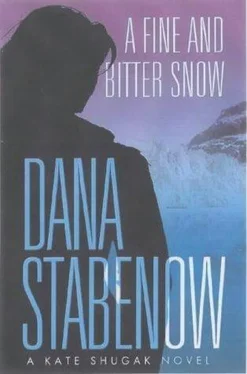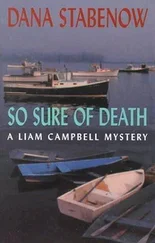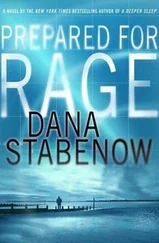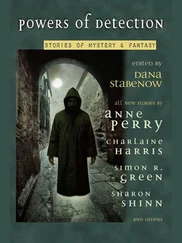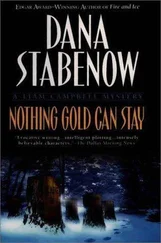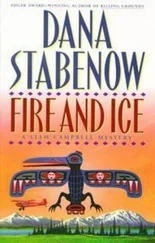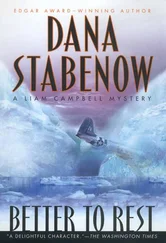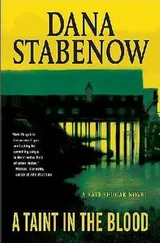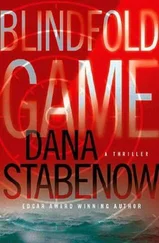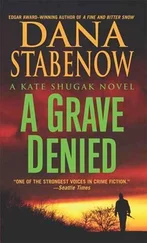“He was at Hue. Private Riley Higgins, Seventh Cav.” He shook his head, exited, and sat back. “No wonder the poor fucker’s crazy.”
“I would remind you that this particular poor fucker killed Dina Willner, and may have killed Ruthe Bauman while he was at it,” Kate said tartly.
“Poor pucker,” Katya said sadly, trying to twist a Rubik’s Cube on the floor at Bobby’s feet.
“Listen to the girl, wouldja, she’s talking good as her daddy!” Bobby roared, snatching up his daughter and cradling her in his arms. Katya blinked up at him, surprised, and then gave him a blinding smile and a smacking kiss.
Dinah sighed and looked at Jim and Kate. “Soup’s on.”
It wasn’t soup; it was a big moose roast with the bone in, served with potatoes and carrots in a thick brown garlicky gravy and big hunks of fresh-baked brown bread. They dug in with a will.
After dinner, when Katya was tucked safely into bed and had fallen obligingly into a deep sleep-“Not to be heard from again until three A.M.,” said her loving mother-the four of them gathered around the fireplace. Jim and Bobby drank coffee laced with Bobby’s favorite Kentucky whiskey, and Dinah sat Kate down on a chair from the kitchen table, tucked a dishcloth around her neck, and proceeded to trim her hair.
“Is that normal behavior for posttraumatic stress syndrome, Bobby?” Kate asked him. “One minute, Riley Higgins was fine, conversing with me in a normal tone of voice. The next minute, he was screaming at the top of his lungs and hiding under the bed.”
Bobby snorted. “There is no normal.” He contemplated his mug and sighed. “You know one of the reasons I wound up in Alaska?”
“What?” Dinah bent Kate’s head forward and to one side to trim the hair on the back of her neck. Snip, snip. Black hair whispered down to the cloth. Jim was mesmerized.
“Because,” Bobby said, “Alaska was home to one of two-count ‘em, only two-U.S. senators to vote against the Tonkin Gulf Resolution. Ernest Gruening, bless his bald head, whatever cloud he’s sitting on, I hope he’s got a babe on each arm and a gallon of sipping whiskey sitting in front of him that never goes dry.” He raised his mug in a toast.
“I went over in ‘68, same year as Higgins. Jesus, what a year. Started off with Tet-welcome to Vietnam, and don’t let the door hit you in the ass on your way out-Martin dead, Bobby dead, Chicago, the sit-ins, the riots, the demonstrations, Johnson quitting so he wouldn’t have to lose a war, Nixon in-Jesus squared-man, everybody was just so pissed off at everybody else. There was no peace to be found anywhere in this country. And then-’one, two, three, what are we fightin‘ for’-off I go to the Vietnam War. Only, wait, it wasn’t a war, because Congress never said it was, it was only a police action. And it sure as hell wasn’t like the goddamn government had made any effort to convince me that I was fighting for truth, justice, and the American way.”
He wheeled over to the stove and brought back the coffeepot, pouring warm-ups all around. Jim, still engrossed in Kate’s haircut, had to be nudged to get his attention. Miraculously, Bobby did not call it to everyone’s attention at the top of his voice, for which Jim was profoundly thankful. “You know the difference between a war and a police action in the middle of the jungle, with the enemy planting mines and pongee sticks for you to walk on and your own zoomies hitting you with Agent Orange and napalm from overhead? I’ll tell you. Nothing.” He topped off his cup with the bottle of golden brown liquor that took pride of place on the end table next to the couch.
“Still,” he said. “Sometimes we act like it’s the only war that ever happened, that ever mattered. Shit. Some battles in the Civil War, they lost more casualties in a day than we lost in our whole time in the Nam.”
“So you’re not into self-pity,” Jim said. How the hell long did it take to cut a head of hair, for God’s sake? He shifted uncomfortably on the couch. “We got that. What about Higgins? What did his record say? Did something happen to him over there to make him like he is now?”
“Jesus H. Christ, haven’t you been listening! Something happens to everybody over there, in every war!”
Katya, used to Daddy’s bellow, slept serenely on, but Dinah gave him a severe look. More temperately, Bobby said, “Of course something fucking happened to him. He was stuck down in the middle of a jungle and people were shooting at him. Somebody shoved a rifle in his face and told him to shoot back. Maybe he shot a kid.” He cast an involuntary glance over his shoulder at Katya. “Maybe he fragged his looie. Maybe his looie did a Calley and he went along, and maybe the only way he can deal with the world is not to come back to it. It happens. It happens in every war.”
Bobby pointed with his mug. “And you have to consider this, too-maybe nothing happened. Maybe he was just one of those poor bastards who can’t take combat, period. It was battle fatigue in World War Two, shell shock in World War One, and they probably called it something else in the Civil War and something else again in the War of the Roses. Who the hell knows? Guys like Higgins, some can deal, some can’t.” He rubbed the stubs of the legs sticking out over the edge of his wheelchair. “Some can’t,” he repeated.
“He’s crazy as a bedbug now,” Jim said with a sigh. “I guess that’s what matters.” He looked back at Kate, and didn’t know if he was relieved or disappointed to see Dinah untying the dishcloth and using it to flick hairs off Kate’s shirt.
Kate was looking at Mutt, who was snoozing in front of the fireplace, her head resting on what looked like the jawbone of an ass, or maybe a woolly mammoth. “She let him scratch her head.”
“What? Who?”
“Mutt. She let Higgins scratch her head.”
Jim looked at Mutt. “You been stepping out on me, girl?”
Mutt twitched an ear but did not otherwise respond.
“The thing is,” Kate said, and then thought better of it. “Never mind.”
“Never mind what?”
Kate made a face. “She’s good about people, okay? She doesn’t like bad guys. And she let this guy scratch her head. It’s just-odd, that’s all.” She looked sorry she’d said anything.
“Who wants dessert?” Dinah said briskly, folding the towel around the shears. “Apple pie, left over from the pot-latch. Great potlatch, by the way, Kate. You done good.”
“Yeah!” Bobby said. “That old broad would have had a hell of a good time. The true test of a good wake, if the deceased would have wanted to be there.”
Dinah brought out pieces of pie adorned with whipped cream. It wasn’t as good as Ruthe’s rhubarb, but it wasn’t bad.
“Listen, Bobby,” Kate said, “did you ever hear anything about Dina Willner being-ouch!” This when Jim kicked her, not gently, in the right shin. She glared. “What?” “Great pie,” Jim said, his mouth full. “Isn’t it?”
Out on the porch, Jim said to Mutt, “So you let Higgins scratch your head, did you, girl?” He cast a look at Kate. “Considering the way she usually greets me, you must think I’m a prince.”
“Why did you stop me from telling them about Dina and John Letourneau?”
“Because we’re going to see Letourneau next, and I want to talk to him about it before Bobby broadcasts it on Park Air.” He paused. “He wasn’t at the potlatch.”
“He doesn’t go to them, usually. Why do you want to talk to him about it at all? It’s ancient history. You said yourself that the marriage certificate was from twenty-five years ago. Jim!” She trailed after him to her snow machine, upon which she had found herself chauffeuring him around that afternoon. Mutt was lucky Kate had hooked up the trailer to bring the potlatch pictures into town. “And what’s with this ‘we?” “
Читать дальше
